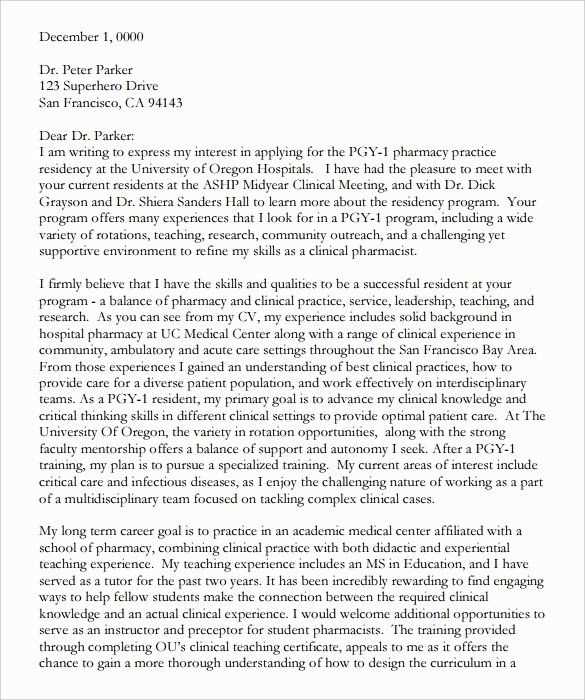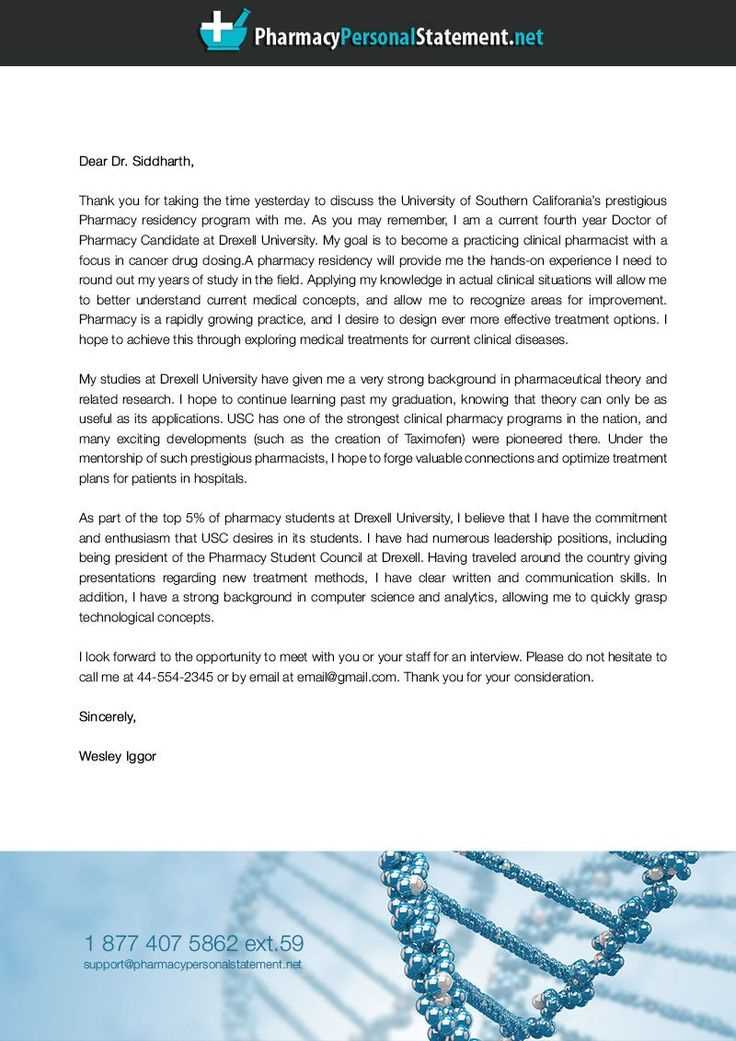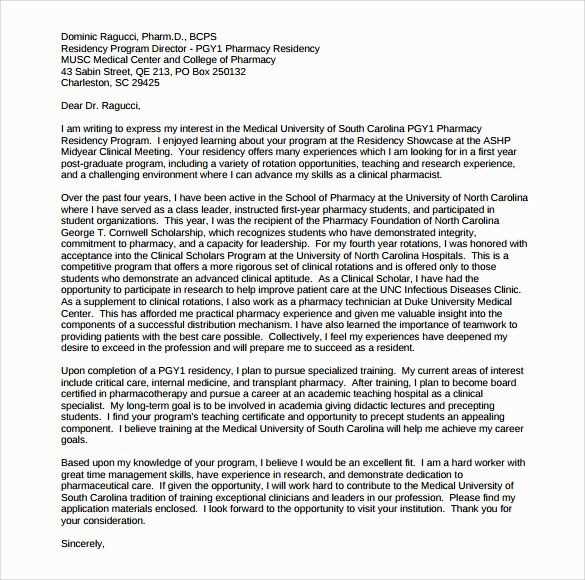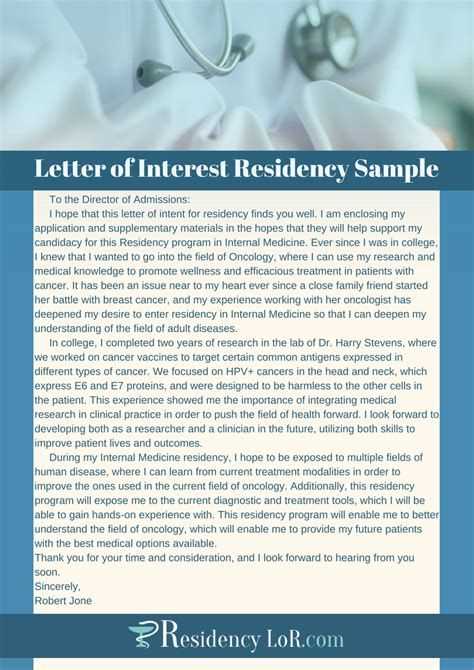Letter of Intent Template for Residency Applications

When applying to competitive medical programs, it’s crucial to convey your motivation and qualifications in a well-structured and thoughtful manner. A compelling document can help demonstrate your dedication and suitability for the program, offering insight into your goals and experience.
Creating a clear and impactful statement allows you to stand out among other candidates. By focusing on your strengths, experiences, and future ambitions, you can craft a message that resonates with selection committees and enhances your overall application.
By following a specific structure and paying attention to important details, you’ll ensure your application stands out in a positive way. Crafting a strong document is an essential step toward securing a place in your desired program.
Why a Letter of Intent Matters

In the competitive world of medical program admissions, every opportunity to showcase your skills and aspirations counts. A well-crafted personal statement serves as a critical tool in demonstrating your passion, suitability, and potential for the program. It provides the admissions committee with a deeper understanding of who you are beyond your academic achievements.
Highlights Your Commitment and Motivation
By articulating your journey, goals, and dedication, this document helps convey your genuine interest in the program. It allows you to present a narrative that shows your enthusiasm for the field and your desire to contribute meaningfully to the profession.
Sets You Apart from Other Applicants
While grades and experience are crucial, the personal statement gives you the chance to stand out with your unique perspective and personal story. It highlights qualities and attributes that can make a significant difference in the selection process, positioning you as an ideal candidate for the program.
Key Elements of a Residency Letter

To create a compelling application document, certain core components must be included to ensure your message is clear, effective, and persuasive. These elements work together to provide a complete picture of your qualifications, motivation, and commitment to the program.
- Introduction: Briefly introduce yourself and explain your interest in the program. This is your chance to make a strong first impression.
- Background and Experience: Highlight your academic and professional journey, emphasizing key experiences that have prepared you for this opportunity.
- Motivation and Goals: Clearly articulate why you are passionate about the field and how the program aligns with your future aspirations.
- Personal Attributes: Showcase qualities that make you a strong candidate, such as your work ethic, determination, and ability to work in a team.
- Conclusion: End with a strong, positive closing that reiterates your commitment and enthusiasm for the program.
Incorporating these elements ensures that your document is well-rounded and makes a lasting impression on the admissions committee, giving them a full understanding of your qualifications and motivations.
How to Start Your Letter Effectively
Beginning your application document with a strong and engaging opening is essential for capturing the reader’s attention. The first few lines should set the tone, highlighting your enthusiasm while establishing your qualifications and suitability for the program.
Grab Attention with a Compelling Hook
Start by introducing a key experience, personal anecdote, or insight that reflects your genuine passion for the field. This creates an immediate connection with the reader and invites them to continue reading.
Clearly State Your Purpose
After the initial hook, it’s important to directly state your intent for applying. Let the reader know why you are pursuing this opportunity and what draws you to this specific program. Keep this part concise but impactful, showing your dedication and clarity of purpose.
Tips for Showcasing Your Skills
Effectively showcasing your skills and experiences is key to standing out in a competitive selection process. The way you present your qualifications can make a significant impact on how the admissions committee perceives your capabilities. A strategic approach can highlight your strengths and demonstrate how you will contribute to the program.
Focus on Relevant Experiences
Tailor your experiences to emphasize those that are most relevant to the program. Rather than listing every accomplishment, focus on key moments where your skills directly align with the goals and values of the opportunity you’re applying for.
Use Specific Examples and Outcomes
Instead of speaking in generalities, provide clear examples of your achievements. Quantifying your successes with specific outcomes or results gives weight to your claims and shows your practical impact in past roles.
| Skill | Example | Outcome |
|---|---|---|
| Leadership | Led a team of 5 in a clinical research project | Increased project efficiency by 20% |
| Problem-solving | Developed a streamlined process for patient intake | Reduced wait times by 30% |
| Communication | Presented findings at a national conference | Received positive feedback from peers and mentors |
By focusing on measurable achievements, you demonstrate not only your skills but also your ability to create tangible results in your field.
Avoid Common Mistakes in Letters
Crafting an effective application document requires attention to detail, and avoiding common pitfalls can significantly improve your chances of success. Mistakes, whether they are related to tone, structure, or content, can weaken your message and lessen your impact on the selection committee.
Overloading with Irrelevant Information

One of the most common mistakes is including too much unnecessary detail. Keep the focus on experiences and achievements that directly relate to the program. Avoid long-winded stories or personal anecdotes that don’t highlight your qualifications or motivations.
Using a Generic Approach
It’s important to tailor your document to the specific program. A generic message that could apply to any opportunity will not stand out. Take the time to customize your message by addressing what makes this particular program appealing and how it fits with your personal goals.
Perfecting Your Closing Statement
The closing statement of your application is a vital component that leaves a lasting impression on the reader. It is your final opportunity to reaffirm your enthusiasm for the program and reinforce why you are an ideal candidate. Crafting a compelling and concise conclusion can make all the difference in how your application is perceived.
Summarize Your Qualifications and Enthusiasm
End your document by briefly recapping your key qualifications, skills, and experience. Reinforce your passion and highlight how the program aligns with your career aspirations.
Convey Your Commitment
Clearly express your dedication to contributing to the program and the field. A strong closing demonstrates your readiness to take the next step and shows that you are fully invested in the opportunity.
- Reaffirm your interest in the program.
- Summarize key reasons why you are an ideal fit.
- Express gratitude for the opportunity to apply.
By following these steps, you can leave a strong, positive final impression that enhances your overall application.